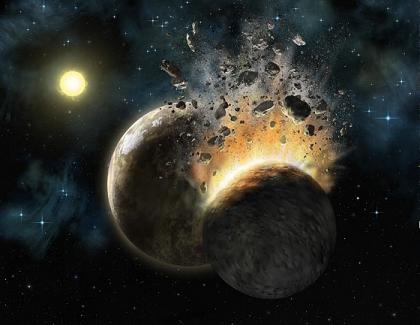
Newtonian astrologers and scientologists are now hedging against the ignorance of their 17th century religion by admitting defeat.
Democritus/Velikovsky 1 - Newton/Lyell 0.
BBC: 'Tiny chance' of planet collision. (Hat tip: Anaconda via Wattsupwiththat)
Astronomers calculate there is a tiny chance that Mars or Venus could collide with Earth - though it would not happen for at least a billion years.LOL @ astrologers.
The finding comes from simulations to show how orbits of planets might evolve billions of years into the future.
But the calculated chances of such events occurring are tiny.
Writing in the journal Nature, a team led by Jacques Laskar shows there is also a chance Mercury could strike Venus and merge into a larger planet.
Professor Laskar of the Paris Observatory and his colleagues also report that Mars might experience a close encounter with Jupiter - whose massive gravity could hurl the Red Planet out of our Solar System.
Astronomers had thought that the orbits of the planets were predictable.
"Let now the astrologers, the stargazers, the monthly prognosticators, stand up, and save thee from these things that shall come upon thee. Behold, they shall be as stubble; the fire shall burn them; they shall not deliver themselves from the power of the flame...." -- Isaiah 37:13-14
But 20 years ago, researchers showed that there were slight fluctuations in their paths.Worlds In Collision was published in 1950 so that would be 59 years ago, not 20 years ago.
Now, the team has shown how in a small proportion of cases these fluctuations can grow until after several million years, the orbits of the inner planets begin to overlap.
The researchers carried out more than 2,500 simulations. They found that in some, Mars and Venus collided with the Earth.
"It will be complete devastation," said Professor Laskar.
"The planet is coming in at 10km per second - 10 times the speed of a bullet - and of course Mars is much more massive than a bullet."
Professor Laskar's calculations also show that there is a possibility of Mercury crashing into Venus. But in that scenario, the Earth would not be significantly affected.
"If there is anyone around billions of years from now, they'd see a burst of light in the sky and the two planets would be merged," he said.
"The new planet would be a little bit bigger than Venus, and the Solar System would be a little more regular after the collision, but the Earth's orbit would not be affected."














3 comments:
@ OilIsMastery:
Velikovsky seems to have possible vindication, there are two outstanding questions: The Nautre paper postulates it as a possible event into the distant future, so questions are could it have happened in the past and is there a "mechanism" that would accelerate the process?
I offered in the prior post Dr. Anthony Peratt's work documenting a historical order of magnitude increase in the Sun's electromagnetic energy that caused a very strong increase in aurora activity as a result of intense Birkeland currents forming a plasma cage/plasmoid around the Earth.
This would not have effected the Earth in isolation, but all the planets.
But would it have caused the orbits to change dramatically in a relatively short period of time?
Something to investigate.
"Velikovsky seems to have possible vindication"
Already vindicated imo...=)
It was always known that any mathematicin could not solve a three body problem. Chaos theory was formed based on this and other observations of nature. The solar system has more than three ......!
Add electricity and the problem is insoluble. This is nothing more than BS, but then what do we expect from these people?
Why publish this in this form and why now? Increase the fear? I expect more of this as oil gets to $250 and the $ buys 0.10 Euro .....
@ Anaconda and OIM
http://www.etheric.com/LaViolette/Predict.html
Read and enjoy!!!! Cat Ass Trophy! http://www.jamesphogan.com/bb/CPG.html
Post a Comment